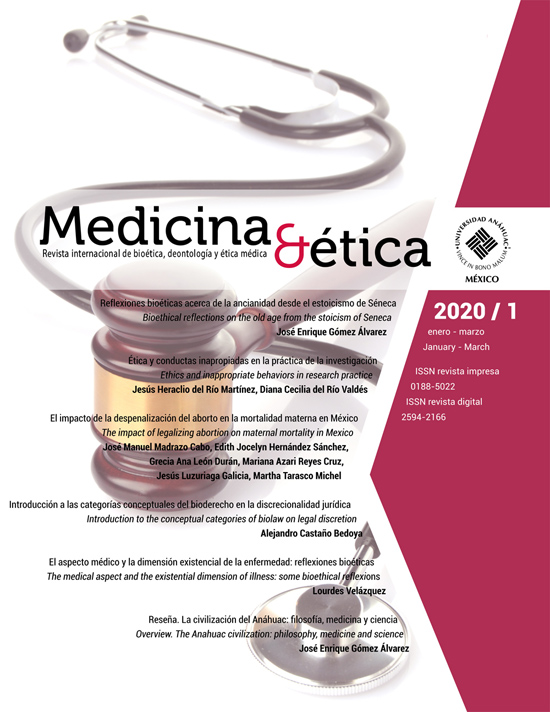The medical aspect and the existential dimension of illness: some bioethical reflexions
Main Article Content
Abstract
According to the «classic» notion, the purpose of medicine was helping preserve and recover health; understanding health as physical, emotional and vital wellbeing, influenced by material actions, as well as supernatural and cosmologic inflows. During the Renaissance, modern science offered its knowledge to medicine, which stopped considering supernatural and cosmic inflows. In addition, the Cartesian notion of Dualism reduced medicine to look exclusively into the body construed as a machine according to proposed models based on different sciences. This physicalist and analytical perspectives have provided for significant achievements. However, illness implies, as far as the experience lived by the patient is concerned, aspects of existential discomfort, fragility, dependence, loss of identity which oftentimes medicine disregards for being subjective. This mistake should be avoided by supplementing medical expertise with the several sources offered by philosophy, arts, religion, which allow the sick to find inside themselves the support required to give meaning and value to their lives in their actual conditions.
Downloads
PLUMX Metrics
Article Details
Medicina y Ética is distributed under a Creative Commons License Atribución-NoComercial-CompartirIgual 4.0 Internacional.
The author keeps the property rights with no restriction whatsoever and guarantees the magazine the right to be the first publication of the work. The author is free to deposit the published version in any other medium, such as an institutional archive or on his own website.
References
ALVARADO GARCÍA, A. La ética del cuidado. Aquichan. 2004; 4/1.
CASTELLANOS, P. L. Sobre el concepto de salud y enfermedad. Boletín Epidemiológico. 1990; 10/4.
BERNARD, C. Introducción al estudio de la medicina experimental, trad. de A.ESPINA Y CANO. Editorial Crítica, Barcelona, 2005.
FRANCO PELÁEZ, Z.R. La bioética y la ética del cuidado para el desarrollo humano integral. Hacia la humanización de la salud. 2009; 14/1, 93-108. Disponible en: https://doi.org/10.2307/j.ctv893jjj.6
HUSSERL, E. The Crisis of European Sciences and Transcendental Phenomenology: An Introduction to Phenomenological Philosophy. North-Western University Press, Illinois, E.U. 1970.
HUSSERL, E. La filosofía como autorreflexión de la humanidad. Invitación a la fenomenología. Paidós, Barcelona, 1992.
HUSSERL, E. Meditaciones cartesianas. Tecnos, Madrid, 2013.
JASPERS, K. Psicopatología general. Fondo de Cultura Económica, México, 2006.
JOUANNA, J. The Legacy of the Hippocratic Treatise the Nature of Man: The Theory of the Four Humours. Greek Medicine from Hippocrates to Galen. Selected Papers, Netherlands, 2012; 335-360. Disponible en: https://
doi.org/10.1163/9789004232549_017
KAY TOOMBS, S. The Meaning of Illness. A Phenomenological Account of Different Perspectives of Physician and Patient. Kluwer, Dor-drecht/Boston/London, 1992.
LAÍN ENTRALGO, P. Historia de la medicina. Elsevier Masson, Barcelona, 1978; reimpresión 2006.
SALLES, R. Aristóteles, Crisipo y el problema de la generación de los cuerpos homogéneos complejos. Signos filosóficos. 2008; 10(19), 9-40. Disponible en: http://www.scielo.org.mx/scielo.phpscript=sci_arttext&pid=S1665-13242008000100001&lng=es&tlng=es.
SZAZ, TH. The Myth of Mental Illness: Foundation of a Theory of Personal Conduct.
Harper& Row, HarperCollins e-books.1961; reimpresión 2011.
TEICH, M. From Pre-classical to Classical Pursuits. In The Scientific Revolution Revisited. Cambridge, UK. Open Book. 2015; pp. 11-28. Disponible en: https://doi.org/10.11647/obp.0054.01
THOMSON, A. L’homme-machine, mythe ou métaphore? Dix-huitème Siècle 20. 1988; 367-376. Disponible en: https://doi.org/10.3406/dhs.1988.2879
URIBE CANO, J.M. El concepto de salud y enfermedad: una reflexión filosófica.
CES Medicina, Medellín, 2013. Disponible en: https://doi.org/10.21615/cesmedicina. 30.1.15
VIESCA TREVIÑO, C. Medicina prehispánica de México; el conocimiento médico de los nahuas. Panorama, México, 1986.
VELÁZQUEZ, L. La civilización del Anáhuac: filosofía, medicina y ciencia. Ed. NUN. México, 2019.
ZAMPIERI, A. Medicina del Seicento: la scuola iatromeccanica e iatrochimica. Pisa Medica, 2011. Disponible en: http://pisamedica.it/2011/02/medicina-del-seicentolescuole-iatromeccanica-e-iatrochimica/

